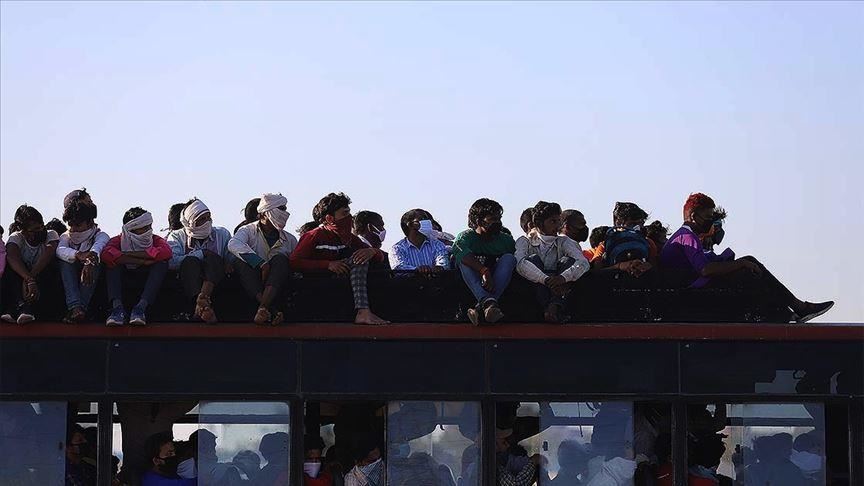COVID-19: Lockdown leaves millions jobless, helpless in Bangladesh
Around 9M transport workers have no income since lockdown started on March 26

DHAKA, Bangladesh
Millions of transport workers in Bangladesh have been left jobless after the government imposed a nationwide lockdown to stem the spread of the novel coronavirus.
According to rights groups and labor unions, an estimated 9 million workers have no source of income ever since March 26 when the government barred all transport operations, except emergency services.
Largely working on a contractual basis and relying on daily earnings, they have been left without any financial assistance due to the poor wage structure of the transport sector, the groups said.
Two transport workers – one in the capital Dhaka and the other in the southeastern port city Chattogram – spoke to Anadolu Agency on condition of anonymity, fearing reprisal from their employers.
“We’re paid as long as our vehicles are running. As soon as the wheels stop, so does the money. This is because of our contracts; we’re not permanent staff members, so our income depends on our daily work,” said the worker in the capital.
The man in Chattogram lamented the lack of support from the government, transport company owners, and labor associations.
“I know about hundreds of transport workers who have no work at all since the government imposed these restrictions. They have no option but to sit idle. Many can’t even afford daily food for their families any longer,” he told Anadolu Agency.
“But there’s no sign of any financial assistance from anywhere; the government, owners, and associations are doing nothing to help us.”
Call for solidarity
A local organization, Bangladesh Passenger Welfare Association, has urged operators and unions to ensure support for nearly 9 million transport workers, including drivers and other staff, affected by the crisis.
“According to unofficial data, there are 7 million workers in land transport and 2 million more working in sea transport in Bangladesh. Almost all of them are facing immense troubles at the moment and are getting no help from owners, unions, or other labor bodies,” Mozammel Hoque Chowdhury, the association’s secretary general, told Anadolu Agency.
He said there were several reports that transport company owners and union leaders had embezzled funds collected for workers’ welfare.
“There is no standard wage structure in the transport sector. Owners and operators are reluctant to give workers permanent contracts,” he explained.
“We’re seeing more and more transport workers leaving this line of work. Some estimates say 10% of the entire workforce has switched to other professions just over the past two weeks.”
No one to help
Md Hanif Khokan, head of the Bangladesh Road Transport Labor League, said nearly 7 million road transport workers in the country have no proper employment agreements.
“We don’t get official appointment letters. Our contracts are for daily or monthly wages and we’re not entitled to any other allowances or benefits. We will remain deprived of our rights until this structure is changed,” he said.
Khokan, who works as a driver himself, explained that their earnings are further dented by a culture of extortion under the guise of welfare funds, locally known as “chanda.”
“We have to pay a certain amount for the welfare fund at various points on our routes and at the bus or truck terminals,” he told Anadolu Agency.
He said some groups were exploiting the situation so the amount was fixed in 2010 after negotiations between transport owners and workers in the presence of police officials, but it had failed to improve things.
“But when the time comes, there’s no sign of any owner, union leader, or the money these workers contributed to the welfare fund,” he said.
Promises and corruption
Khandaker Enayet Ullah, secretary general of the Bangladesh Road Transport Owners' Association, claimed that transport operators are trying to help the workers in need.
“We’re preparing a formal plea to Prime Minister Sheikh Hasina, seeking special funds to assist the workers affected by the lockdown,” he told Anadolu Agency.
“We’re doing our best to help all transport workers during this difficult time.”
Enayet Ullah is a member of the country’s ruling party and an influential figure in the transport sector.
However, his words might be of little comfort to transport workers since he is the subject of a corruption inquiry launched earlier this year.
In February, the country’s Anti-Corruption Commission started an investigation over reports that Ullah earned over 10 million Bangladeshi taka ($125,000) on a daily basis through extortion in the transport sector.
He has rejected the allegations as a "conspiracy" against him.
Anadolu Agency website contains only a portion of the news stories offered to subscribers in the AA News Broadcasting System (HAS), and in summarized form. Please contact us for subscription options.







